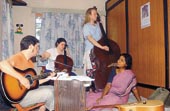 |
| Oliver Weeks, Rosalind Acton, Ben Hillyard and Moushumi Bhowmik rehearse on Sunday. Picture by Sanjoy Chattopadhyaya |
During the golden age of adhunik Bangla gaan, the songs were the products of highly sensitive minds.
The Sixties onwards, it degenerated into a cacophonous mix of saxophone riffs and thrums on the guitar shaken but not stirred with vocals and tabla beats.
Now, save the language that vaguely resembles the vernacular many of us are familiar with, Bengali songs sound more like Seventies? rock and pop than anything else.
Moushumi Bhowmik was a trendsetter. She was one of the first musicians who composed and sang her own lyrics. Although she had a sonorous and dignified voice, and in spite of having a steady fan following, her rather unfortunate experiences with recording companies hampered her career as a musician.
Then, about seven years ago, she went to live in London with her family, and met guitarist Oliver Weeks at Cambridge University, where she had gone to perform and where he studied. Weeks, who studies composition at the Royal Academy of Music, was already familiar with baul music from Santiniketan and a little Rabindrasangeet.
Weeks introduced Moushumi to Ben Hillyard, also from Cambridge, who plays the double bass in jazz bands and with English folk music. He initially ?joined out of curiosity?.
Cellist Rosalind Acton, also from the same musical background, joined the three to form the ensemble Parapar.
Having successful performances to its credit at various venues in London and Jadavpur University and Santiniketan in the past, the group is here in Calcutta to hold workshops and perform on Thursday under the auspices of the British Council.
As they rehearsed on Sunday afternoon, they created a music that is hard to define. Bhowmik sings about life in Calcutta and even some Bengali folk songs, while the three others weave a web of sound drawn from their experience that complements her voice. It is ?analogous with Bengali music and our (Western) traditions? without making any obvious concessions. Baul, for instance, could lead to the blues.
Weeks says they discuss the lyrics, and while they allow themselves latitudes they do have a basic template and a well-defined structure. ?We try to find points of contact. We try to retain purity of song. The song provides the main body,? he adds. They admit it is difficult but they are getting there. This experience could leave its impress on the sound of Bengali song.










